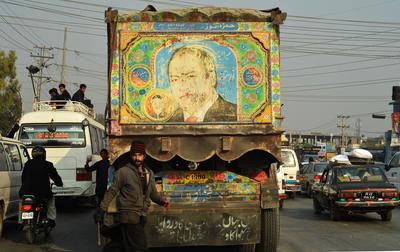Pakistan ushered into 2013 with so much hope for the better. But it remains the case that, on the front lines of war for over three decades — and now consumed by it — there is no other country that is as fractured as Pakistan.
Prime Minister Nawaz Sharif faced big challenges on the domestic and foreign policy fronts. Domestically, crippling power cuts, a moribund economy and widespread violence across the country. On the external front, managing relations with the United States, Afghanistan and India. They are all related.
Power supply improved for some months only through repayments of money due to the power producers. The government has shown no gumption to nab the power thieves and has instead simply raised the tariffs. The power sector debts and thus the power cuts are back. To save on the production costs, there is some movement to convert power plants from oil to coal.
Sharif, identified with business-friendly liberal economic policies, was compelled to seek a new harsh IMF stabilisation package. Widely criticised for resultant rising costs, the package has caused considerable consternation amongst the less privileged. The consumer has never had it so bad.
Privatisation of loss-making public sector enterprises, which drain over Rs 500 billion annually, remains mired in politics, cronyism and serious questions of transparency. With an assertive judiciary and a free media prying, the government is in a precarious position managing harsh IMF terms, economic policy coupling stabilisation with growth policies, and allegations of favouritism in favour of particular tycoons.
The foreign exchange reserves have plummeted to less than a month of imports, leading to a loss of Rupee value by 9 per cent since May 2013 when this government took over. Pakistan lives on the edge.
Though the government claims improved tax collection, it is left to resort to unprecedented bank borrowings and money supply, raising inflation to a 12-year high. The fiscal gap is brought down mainly through cuts in development expenditure.
Sharif’s ‘economic revival program’ is a tax amnesty scheme for the defaulters. A senior public official addressing a seminar in Islamabad has admitted that budget targets have become meaningless.
A populist Rs 100 billion youth business program, which Sharif’s daughter heads, resembles the failed yellow cab scheme of the early 1990s when the state lost US$1.2 billion due to fraudulent implementation. People are sure of a repeat experience.
Terrorism, sectarianism, ethnic violence or crime related to politics resulted in over 5200 fatalities during the year. Bringing peace back, which in turn will likely rebound economic activity, is a major challenge ahead.
The army’s writ continues to hold in sensitive areas of decision-making. The power equation between the civil and army leadership is likely to remain so in the near future.
Sharif’s impulsive bonhomie towards India is on hold following trouble at the Line of Control, jeopardising prospects of normalisation between the two countries, at least for now. His well-meaning statements now look scripted elsewhere. He seems shackled.
Discourse on relations with the United States are now regrettably limited to drones and security issues. Winning elections partly on an anti-drone platform, Sharif remains curiously silent while his ministers ridicule Pakistan Tehreek-e-Insaf for agitating against continued drone strikes. Pakistan should brace itself to face privately conveyed US economic threats against Pakistan.
While Pakistan is the most-affected state due to instability in Afghanistan it is in a no-win situation. The tribal cousins across the Durand Line border between Afghanistan and Pakistan, which Afghanistan does not recognise, cannot be contained. Western powers are unable to understand the tribal and familial compulsions of this cross-border connection. Pakistan will remain under pressure to bring the Afghan resistance to talk to the Karzai government or the Americans, which Pakistan is in no position to deliver. Peace in one country is not possible without peace in the other, and that remains Pakistan’s big challenge.
Sharif’s style of governance remains the same — personalised and confined to a small coterie of men. Important matters of state impacting the wider public are decided behind closed doors with no input and debate in the parliament, which Sharif has not returned to since his election. Making matters worse, irresolute action when it comes to tackling problems of tax evasion by the privileged, bank defaulters and privatisation, for fear of political backlash, demonstrates weak governance on the part of Sharif.
The opposition allowed Sharif a decent honeymoon period — but the honeymoon is now over. With rising prices, unemployment, a general state of lawlessness, lack of basic services for the less privileged and dashed hopes, there are few people beginning the New Year with greater despair than Pakistanis.
Sajjad Ashraf is an adjunct professor at the Lee Kuan Yew School of Public Policy, National University of Singapore, and an associate fellow at the Institute of Southeast Asian Studies, Singapore. He served in the Pakistan Foreign Service 1973–2008.
This article is a part of an EAF special feature series on 2013 in review and the year ahead.


Dear Professor Sajjad Ashraf,
Perhaps what you say in your article is reasonable enough but the fact is that Pakistan, like many other places around the world, is a complete mess, a shambles. You’re just simply nit-picking and finding fault.So don’t blame this person or that or that the economy or policies of government are no good; They’ve had decades to make good and get the country going yet it’s still a mess.
Thank you Mr. Vertannes. You are right. Reform takes time in showing results and I am prepared to concede time to any government as long as the direction is right, which is lacking here in several areas.
There are external compulsions too but no responsible government can continue taking refuge under such pretext. And then, this is the first democratically elected government replacing another that was elected through elections considered free and fair. Peoples’ expectations are therefore high.